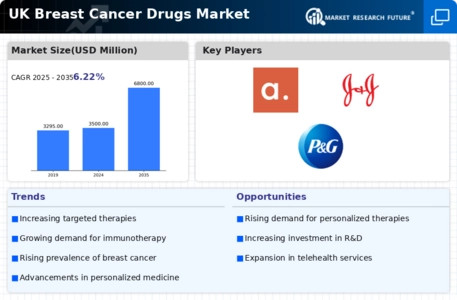Emergence of Biosimilars
The emergence of biosimilars is reshaping the competitive landscape of the Global UK Breast Cancer Drugs Market Industry. As patents for several biologic drugs expire, biosimilars offer a cost-effective alternative, potentially increasing patient access to essential therapies. This trend may lead to a more diverse treatment arsenal for healthcare providers, enhancing patient outcomes. The introduction of biosimilars is expected to stimulate market growth, as they could contribute to a projected market size of 6,800 USD Million by 2035, reflecting the ongoing evolution of treatment options available to patients.
Market Growth Projections
The Global UK Breast Cancer Drugs Market Industry is poised for robust growth, with projections indicating a market size of 3,500 USD Million in 2024 and an anticipated increase to 6,800 USD Million by 2035. This growth trajectory suggests a compound annual growth rate of 6.22% from 2025 to 2035, driven by various factors including advancements in treatment modalities, increasing patient awareness, and government support. Such projections underscore the dynamic nature of the market and the potential for continued innovation and investment in breast cancer therapies.
Rising Incidence of Breast Cancer
The increasing incidence of breast cancer in the UK is a primary driver for the Global UK Breast Cancer Drugs Market Industry. Statistics indicate that approximately 55,000 new cases are diagnosed annually, leading to a heightened demand for effective treatment options. This trend is expected to contribute significantly to the market's growth, with projections suggesting that the market could reach 3,500 USD Million in 2024. The urgency for innovative therapies and drugs to address this growing patient population is likely to stimulate research and development efforts within the pharmaceutical sector.
Advancements in Targeted Therapies
Recent advancements in targeted therapies are transforming the treatment landscape for breast cancer, thereby propelling the Global UK Breast Cancer Drugs Market Industry. Drugs such as trastuzumab and palbociclib have demonstrated efficacy in specific patient populations, leading to improved survival rates. The introduction of personalized medicine approaches is expected to enhance treatment outcomes, which may encourage healthcare providers to adopt these therapies more widely. As a result, the market is anticipated to experience a compound annual growth rate of 6.22% from 2025 to 2035, reflecting the growing reliance on targeted treatment modalities.
Government Initiatives and Funding
Government initiatives aimed at combating breast cancer are pivotal in shaping the Global UK Breast Cancer Drugs Market Industry. The UK government has committed substantial funding towards cancer research and drug development, which is likely to facilitate the introduction of new therapies. For instance, the National Health Service has implemented programs to enhance early detection and treatment access, thereby increasing the patient pool for breast cancer drugs. This proactive approach is expected to contribute to the market's growth trajectory, with forecasts indicating a potential market size of 6,800 USD Million by 2035.
Increasing Awareness and Screening Programs
The rise in awareness regarding breast cancer and the importance of early detection is significantly influencing the Global UK Breast Cancer Drugs Market Industry. Public health campaigns and educational initiatives have led to a greater understanding of breast cancer symptoms and the necessity for regular screenings. This heightened awareness is likely to result in earlier diagnoses, thereby increasing the demand for treatment options. As more individuals seek medical intervention, the market is poised for growth, aligning with the projected increase in market value to 3,500 USD Million in 2024.














Leave a Comment